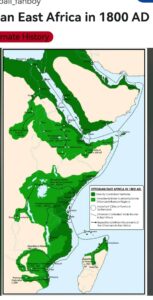Eritrea’s history is a complex tapestry woven through centuries of colonialism, regional conflicts, and ongoing diplomatic struggles. The evolution of Eritrea’s identity is shaped significantly by external influences and its quest for self-determination. This essay will examine critical historical events, influential figures, regional dynamics, and the implications for future developments in the Horn of Africa.
Eritrea’s story begins with the Ottoman Empire’s influence in the 16th century. The empire established control over the Red Sea coast, particularly the strategic port city of Massawa. This era marked the onset of external domination in Eritrea, which set the stage for future conflicts and colonial interests. However, by the 19th century, internal strife led to a weakened Ottoman grip. This vulnerability allowed European colonial powers to vie for control over Eritrea, making it a focal point for ensuing struggles over resources and strategic advantages.
Italy formally colonized Eritrea in 1890, marking a significant shift in the territory’s governance. As Italy’s first colony in Africa, Eritrea became a vital base for Italian ambitions in the Horn of Africa. The Italian colonial administration made considerable investments in infrastructure, establishing railways and ports to facilitate resource extraction. Nevertheless, this progress came at a high cost, as the indigenous population endured exploitation and oppressive rule. Italy’s colonization introduced a modern administrative structure but also intensified ethnic divisions among the local communities.
The geopolitical landscape transformed dramatically in 1936 when Italy invaded Ethiopia, merging Eritrea with Ethiopia and Italian Somaliland to create Italian East Africa. This merger exacerbated tensions in the already volatile region and laid the groundwork for future conflict. The implications of this reorganization would resonate for decades, particularly as national identities began to conflate and clash under the weight of colonial rule.
World War II brought about a significant change when British forces defeated Italy in East Africa and began occupying Eritrea in 1941. The British Military Administration (1941-1952) marked a contentious period characterized by debates regarding Eritrea’s future. Ethiopia, backed by some Allied powers, asserted claims based on inconsistent historical and cultural ties. This led to the United Nations’ intervention in 1950, proposing a federal arrangement through Resolution 390(V). This resolution granted Eritrea constitutional autonomy while placing it under Ethiopian sovereignty for a decade, suggesting a pathway toward self-determination.
However, tensions escalated when Emperor Haile Selassie of Ethiopia unilaterally dissolved Eritrea’s autonomous status in 1962. This act ignited the Eritrean War of Independence, where the Eritrean Liberation Front (ELF) and later the Eritrean People’s Liberation Front (EPLF) spearheaded the armed struggle against Ethiopian rule. The plight of Eritrea attracted little attention from the international community, highlighting a disconnect between global diplomacy and the local realities faced by Eritreans. Many nations prioritized strategic interests over Eritrea’s legitimate aspirations for self-determination.
The fall of the Ethiopian Derg regime in 1991 marked a watershed moment for Eritrea. The EPLF, in coalition with other rebel groups, overthrew Mengistu Haile Mariam’s government. Following this victory, a UN-monitored referendum in 1993 culminated in Eritrea’s official declaration of independence, with over 99% of voters supporting this decision. This historic moment instilled unprecedented hope among the Eritrean populace, symbolizing the end of a long struggle for autonomy.
Nevertheless, peace was short-lived. Border disputes resurfaced, particularly concerning the town of Badme, which became a flashpoint for conflict between Eritrea and Ethiopia. The Eritrean-Ethiopian War from 1998 to 2000 inflicted severe casualties and economic devastation on both nations. The Algiers Agreement in 2000 sought to resolve these conflicts, establishing the Eritrea-Ethiopia Boundary Commission (EEBC) to demarcate borders. Although the commission awarded Badme to Eritrea, Ethiopia’s refusal to accept the ruling perpetuated a stalemate marked by ongoing animosity and mistrust.
In recent years, the geopolitical dynamics within the Horn of Africa have evolved. A peace agreement signed in 2018 rekindled hopes for normalized relations between Eritrea and Ethiopia. However, underlying tensions persist, especially regarding Ethiopia’s aspirations for access to the Red Sea through Assab port. This situation underscores the fragility of peace in the region. If the legitimate souvereinty of Eritrea and the historical grievances brought by Ethiopia remain unaddressed or unarbitered, the potential for renewed conflict looms large.
Looking forward, Eritrea faces a rural spectrum of challenges. The legacy of colonialism and the scars of war shape its political landscape. Dialogue and reconciliation are paramount not only between Eritrea and Ethiopia but also with broader regional players. Given the Red Sea’s geopolitical significance—central to global trade routes—stability in the region is urgent.
Eritrea’s complex identity and aspirations for self-determination are deeply entrenched in its historical narrative. Despite gaining independence, unresolved issues with Ethiopia and regional dynamics pose ongoing challenges to long-term peace and stability. A commitment to dialogue under international legal norms, cooperation, and a nuanced understanding of historical context will be essential in shaping Eritrea’s future in the ever-changing political landscape of the Horn of Africa.






